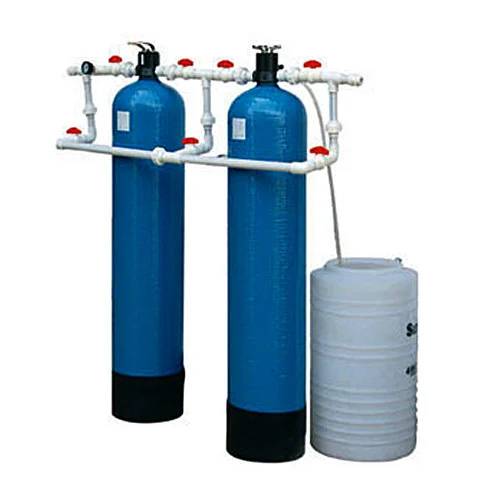
A Water Softener Plant is an industrial solution designed to remove hardness-causing minerals, primarily calcium and magnesium, from water. Hard water can lead to scale formation in pipes, boilers, and other equipment, reducing efficiency and increasing maintenance costs. A water softener plant uses a process called ion exchange to replace these hard minerals with softer ions, typically sodium, to produce soft water suitable for a wide range of industrial, commercial, and residential applications.
Our Water Softener Plant is designed for high performance, long-term operation, and easy maintenance. Whether you’re looking to address scale buildup in your industrial equipment or provide better quality water for your household, our plants offer an efficient and cost-effective solution.
Advanced Ion Exchange Technology: Removes calcium, magnesium, and other hardness-causing minerals through an ion exchange process, delivering soft water with significantly reduced hardness levels.
Customizable Capacity: Available in a variety of sizes and configurations to meet the specific demands of small, medium, and large-scale applications.
Automatic Regeneration: Equipped with an automatic regeneration system that cleans the resin bed using salt, ensuring consistent performance without manual intervention.
Energy Efficient: Designed to operate efficiently with low energy consumption, helping you save on utility costs.
Durable Components: Constructed with high-quality materials, ensuring longevity and reliable performance even in demanding environments.
Low Maintenance: Minimal upkeep is required, with most models featuring easy-to-replace resin beds and automated cleaning systems.
Environmentally Friendly: The softener’s regeneration process uses minimal water and salt, contributing to a more sustainable water treatment system.
Water Softener Plants are essential in many industries and for various applications, including:
Industrial Use:
Boiler & Cooling Systems: Protects boilers and cooling towers from scale buildup, improving heat exchange efficiency and reducing maintenance.
Manufacturing: Ensures smooth operation of machinery and equipment by preventing mineral buildup.
Food & Beverage: Soft water ensures better taste and product quality, particularly in breweries, soft drink production, and food processing.
Pharmaceuticals: Provides soft water for sensitive pharmaceutical manufacturing processes where high-purity water is crucial.
Hotels & Resorts: Ensures better quality water for guests, reducing scale buildup in plumbing, showers, and water-based appliances.
Car Washes: Softened water improves the quality of vehicle washing, leaving a spotless finish without water spots or scaling.
Laundry Services: Soft water helps detergents work more efficiently, improving fabric care and preventing scale accumulation in washing machines.
Home Water Softening: Protects plumbing, appliances (like dishwashers and water heaters), and ensures better skin and hair health by removing hard minerals from the water.
Drinking Water: Provides soft, high-quality water that’s free from harsh minerals, improving taste and clarity.
Prevents Scale Formation: Helps protect pipes, boilers, and industrial equipment from scaling, reducing repair and maintenance costs.
Improves Equipment Longevity: Softened water reduces wear and tear on machinery, extending the lifespan of your equipment.
Energy Efficiency: Soft water enables more efficient heat transfer in boilers and cooling systems, improving overall energy efficiency.
Improves Water Quality: Soft water improves the overall quality of water, providing cleaner, better-tasting water for both industrial and domestic use.
Cost Savings: By preventing scaling, the need for costly repairs and maintenance is minimized, and detergents and soaps work more effectively, reducing consumption.
Environmentally Friendly: Efficient use of water and salt during regeneration minimizes environmental impact.
Ion Exchange: The water softener plant contains a bed of ion exchange resin beads, which are charged with sodium ions. When hard water passes through the resin bed, the calcium and magnesium ions (which cause hardness) are exchanged for sodium ions.
Regeneration Process: Once the resin beads become saturated with hardness-causing ions, the softener initiates the regeneration cycle. This process uses a salt brine solution to flush out the calcium and magnesium ions and replace them with sodium ions, preparing the resin for another cycle of softening.
Backwash & Rinse: After the regeneration cycle, the system backwashes the resin to remove any remaining debris and rinses it to ensure that only clean, soft water enters the system.
Flow Rate: From 1 m³/hr to 1000 m³/hr, customizable based on your needs.
Type: Automatic or manual regeneration.
Material: High-grade stainless steel, fiberglass, or other corrosion-resistant materials for durability.
Salt Consumption: Varies by plant size and hardness of incoming water.
Resin Type: Strong cation resin (typically sodium-based).
Control System: Fully automated or semi-automated systems with programmable timers for easy operation.
Max Operating Pressure: Up to 10 bar (145 psi).
Max Operating Temperature: 40°C (104°F).
Tailored Solutions: Our plants can be designed and sized to meet the specific needs of your facility, ensuring optimal performance and efficiency.
Proven Performance: With years of experience in water treatment, our systems are designed to deliver consistent, high-quality soft water with minimal maintenance.
Sustainability: We focus on creating environmentally friendly solutions that help conserve water and energy, while still providing effective results.
Support & Service: Our expert team offers ongoing support, from installation to maintenance, ensuring your plant operates smoothly for years to come.
Trust Your Partner









